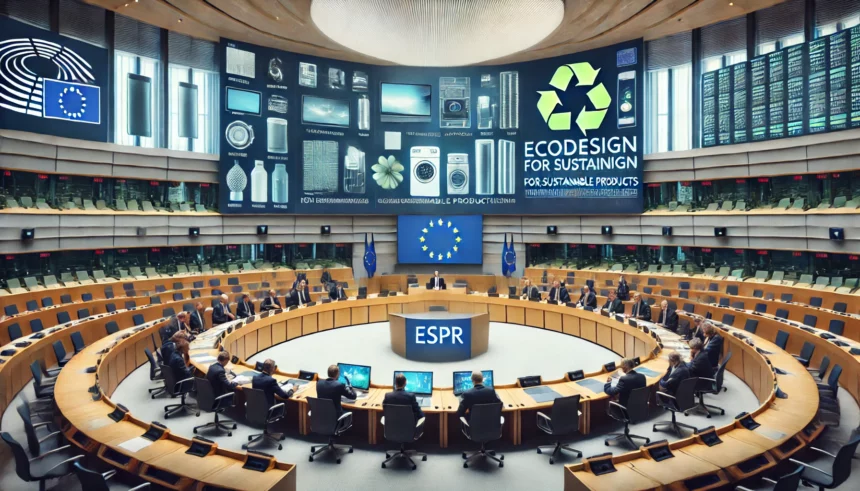What is the Ecodesign Directive?
The European Ecodesign Directive (Directive 2009/125/EC) sets ecological standards for designing certain product groups within the European Union. It works alongside the Energy Labeling Regulation, focusing on the most energy-intensive products. You might recognize these energy labels from your fridge or washing machine.
In 2021, these regulations helped lower energy consumption by 10%, saving consumers a whopping 120 billion euros. This number was estimated to have doubled by 2022!
Ecodesign aims to reduce the environmental impacts of products through thoughtful design solutions, guided by environmental data measured with Life Cycle Assessment (LCA).
Introducing the Ecodesign for Sustainable Products Regulation (ESPR)
Proposed in March 2022, the Ecodesign for Sustainable Products Regulation (ESPR) will replace the current EU Ecodesign Directive. It will bring in more extensive requirements covering a broader range of products, impacting many more companies. By 2030, the ESPR could lead to energy savings equivalent to the EU’s imports of Russian gas.
ESPR and the EU Green Deal
The ESPR is a critical part of the broader EU Green Deal, a policy package aimed at making the EU carbon neutral by 2050 with a budget of about 1 trillion euros. Here’s how it fits in:
- EU’s Green Deal: This is the overarching plan to achieve carbon neutrality.
- Circular Economy Action Plan: Part of the Green Deal, focusing on reducing waste and promoting sustainable products.
- Sustainable Products Initiative: This aims to make sustainable products the norm, with the ESPR as the main policy instrument.
Key Aspects of ESPR
Replacing the Ecodesign Directive
Currently, the Ecodesign Directive covers 29 product categories with energy-related criteria. The new ESPR will expand to a broader range of products, focusing on circularity, durability, reusability, upgradability, and repairability.
Digital Product Passport
A new feature of the ESPR is the digital product passport, which will provide instant sustainability information to supply chain actors, regulators, and consumers.
Addressing Unsold Products
The ESPR will mandate measures to prevent the destruction of unsold products and require companies to disclose disposal data. Large companies face direct bans on destroying unsold textiles and footwear, while smaller businesses have some exemptions and medium-sized companies get a transitional period.
Product Categories Covered
The 29 product groups with Ecodesign criteria in 2024 include:
- Lighting
- Solid fuel local space heaters
- Space and water heaters
- Solid fuel boilers
- Air heating and cooling products
- Fridges and freezers
- Professional refrigerators
- Refrigerators with a direct sales function
- Vacuum cleaners
- Washing machines
- Tumble dryers
- Air conditioners and comfort fans
- Industrial fans
- Ventilation units
- Televisions
- Set-top boxes
- Cooking appliances
- Dishwashers
- Water pumps
- Circulators
- Power transformers
- External power supplies
- Computers and small servers
- Servers and data storage products
- Mobile phones, cordless phones, and tablets
- Electric motors
- Off mode, standby, and networked standby
- Welding equipment
Implementation of ESPR
Each product group regulated under the Ecodesign Directive has its own implementing act, making criteria mandatory. New acts will continue to develop under the ESPR once it comes into force.
For instance, the latest act on mobile phones and tablets, effective from June 2025, requires durable designs, longer-lasting batteries, and prolonged software updates.
Energy Labels
The Ecodesign Directive and Energy Labelling Regulation work hand-in-hand. The Ecodesign Directive makes products more energy-efficient, while the Energy Labelling Regulation helps consumers identify the best-performing products.
Current Plans for ESPR
A provisional agreement reached on December 4, 2023, advanced the ESPR proposal. Once formally adopted, measures like the ban on destroying unsold products will take effect, and new implementing acts will be enforced under the ESPR.
The latest work plan for 2024-2027 includes priority products like iron, steel, aluminum, textiles, furniture, tires, detergents, paints, lubricants, and chemicals.
Preparing for ESPR
Conduct Life Cycle Assessments (LCAs)
Understanding the environmental impact of your product’s entire life cycle is crucial. While the ESPR proposal does not currently mandate LCA, it’s highly likely that future regulations will require environmental data measured by LCA.
Conclusion
The ESPR is a significant step forward in making sustainable products the norm in the EU. By expanding the range of products covered and introducing new requirements like the digital product passport, the ESPR aims to drive substantial environmental and economic benefits. Businesses should start preparing now by assessing their product impacts and aligning with these upcoming regulations.
















